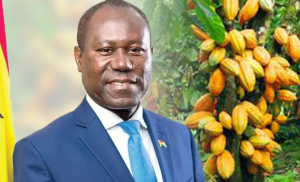Ghana’s cocoa marketing board (Cocobod) made a GH¢2.3 billion ($149.84 million) profit in 2022/23, helped by the restructuring of its debt, the auditor general said in a report obtained by Reuters on Tuesday.
The report showed that the cocoa regulator posted its first profit after six straight years of losses.
Ghana, the world’s number two cocoa producer has been restructuring its $30 billion debt, including debt from the cocoa sector, to be able to implement a $3 billion, three-year International Monetary Fund program and recover from its worst economic crisis in a generation.
Last month, it finalised a deal with its official creditor committee and reached an agreement in principle with two bondholder groups to restructure around $13 billion of its debt, bringing it closer to the end of the debt overhaul.
These milestones followed a domestic debt programme in 2023 in which various bonds, including cocoa bills – securities issued to meet the short-term liquidity needs of Cocobod – were exchanged for long-dated instruments at lower yields.
Cocobod “ended the year with a profit of 2.3 billion cedi, compared with a loss of 4.2 billion cedi in 2022,” said the auditor general report on public corporations and boards yet to be published.
Ray Ankrah, deputy CEO of Cocobod, said the recovery was largely on the back of the debt restructuring.
“There were huge financing costs; we were paying something in the range of 34% but it’s now down to 13% (after the restructuring),” he said.
Ankrah said surging global cocoa prices, increased bean sales, currency stability and better cost management also helped.
The audit report said Cocobod’s revenue increased by 41.7% to 17.7 billion cedi in 2023 due to increased cocoa bean sales.
The report said Cocobod would still struggle to meet its short-term financial obligations as it lacked sufficient liquidity.
Cocoa prices have more than doubled this year on account of disastrous harvests in Ghana and Ivory Coast – which traditionally produce 60% of the world’s cocoa.








